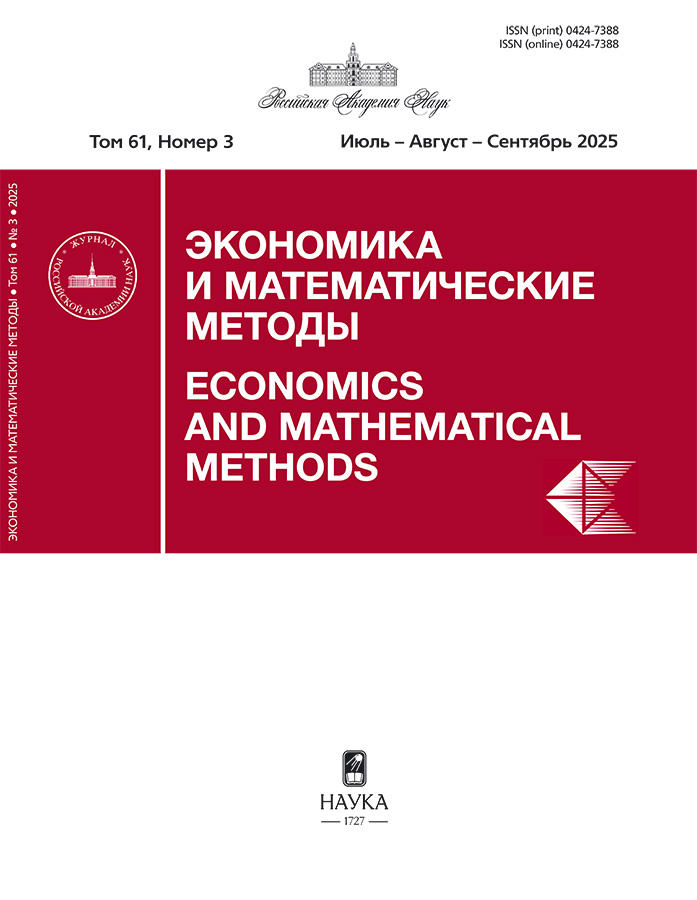Общественный оптимум и ординалистская теория полезности
- Авторы: Некипелов А.Д.1
-
Учреждения:
- Московская школа экономики МГУ им. М. В. Ломоносова
- Выпуск: Том 61, № 3 (2025)
- Страницы: 5-16
- Раздел: Теоретические и методологические проблемы
- URL: https://pediatria.orscience.ru/0424-7388/article/view/691401
- ID: 691401
Цитировать
Полный текст
Аннотация
Необходимость фиксации конкретной формы индивидуальных функций полезности в предложенном А. Бергсоном функционале общественного благосостояния ставит вопрос о наличии метрик, единообразное применение любой из которых ко всем членам рассматривае- мого социума позволяет объективно решать эту задачу. Рассмотрен метод «композитного блага», предполагающий увязку нумерации гиперповерхностей безразличия со «скалярной величиной» набора благ с неизменной структурой, принадлежащего каждой из них. Показано, что его применение при максимизации «бергсониана» в условиях заданных ресурсных ограничений позволяет определить общественный оптимум с точностью до избранного состава соответствующего набора и показателей его «предельной нумерации» у каждого члена социума. Ограничения, проявляющиеся при применении этого метода, заставляют обратиться к самой природе ординалистской парадигмы. Приводятся аргументы в пользу «логической рокировки» понятий «полезность» и «предпочтения» и перехода на этой основе к «обновленному кардиналистскому подходу», в рамках которого понятие «полезность» применялось бы не к отдельным благам, а их наборам. В заключительной части статьи показано, что «формат бергсониана» не является необходимым, как полагал его автор, для того чтобы общественный оптимум характеризовался Парето-эффективностью. Эта же задача решается и при использовании функции общественной полезности, аргументами которой являются количества благ, попадающих в распоряжение каждого члена общества при условии, что в состав ограничений соответствующей модели включается требование равенства у всех членов общества предельных норм замещения благами друг друга.
Об авторах
А. Д. Некипелов
Московская школа экономики МГУ им. М. В. Ломоносова
Email: nekipelov@mse-msu.ru
Москва, Россия
Список литературы
- Маркс К. (1961). Критика Готской программы. В кн.: К. Маркс, Ф. Энгельс «Сочинения». Изд. 2-е. М.: Госполитиздат. Т. 19. С. 9–32. [Marx K. (1961). Critique of the Gotha program. In: K. Marx, F. Engels “Works”. 2 ed. Moscow: Gospolitizdat, 19, 9–32 (in Russian).]
- Маршалл А. (1993). Принципы экономической науки. Пер. с англ. М.: Прогресс. [Marshall A. (1993). Principles of economics. Moscow: Progress (in Russian).]
- Некипелов А. (2023). Поиск социального оптимума: погоня за призраком? // Вестник Российской академии наук. Т. 93. № 5. C. 415–427. [Nekipelov A. (2023). Searching for a social optimum: Chasing a ghost. Herald of the Russian Academy of Sciences, 93 (5), 415–427 (in Russian).]
- Некипелов А. (2024). О возможности формирования обновленной парадигмы теорий индивидуального и группового выбора // Экономика Северо-Запада: проблемы и перспективы развития. Т. 76. № 1. C. 33– 43. [Nekipelov A. (2024). On the possibility of forming an updated paradigm of theories of individual and group choice. Economics of the North-East: Problems and Prospects of Development, 76 (1), 33–43 (in Russian).]
- Arrow K. (1951). Social choice and individual values. N.Y., L.: John Wiley & Sons, Inc., Chapman Hall.
- Bentham J. (1780). An introduction to the principles of morals and legislation. London: T. Payne and Sons.
- Bergson A. (1938). A reformulation of certain aspects of welfare economics. Quarterly Journal of Economics, 52, 310–334.
- Houthakker H. S. (1950). Revealed preference and the utility function. Economica. New Series, 17 (66), 159–174.
- Kreps D. A. (1990). Course in microeconomic theory. Princeton: Princeton University Press.
- Lange O. (1942). The foundations of welfare economics. Econometrica, 10, July–October, 215–228.
- Lerner A. (1944). Economics of Control. N.Y.: The Macmillan Co.
- Samuelson P. A. (1947). Foundations of economic analysis. 6th ed. Bombay, Calcutta, Madras: Oxford University Press.
- Samuelson P. A. (1948). Consumption theory in terms of revealed preference. Economica. New Series, 15 (60), November, 243–253.
- Silberberg E. (1990). The structure of economics. A mathematical analysis. 2nd ed. N.Y.: McGraw-Hill Publishing Company.
Дополнительные файлы











